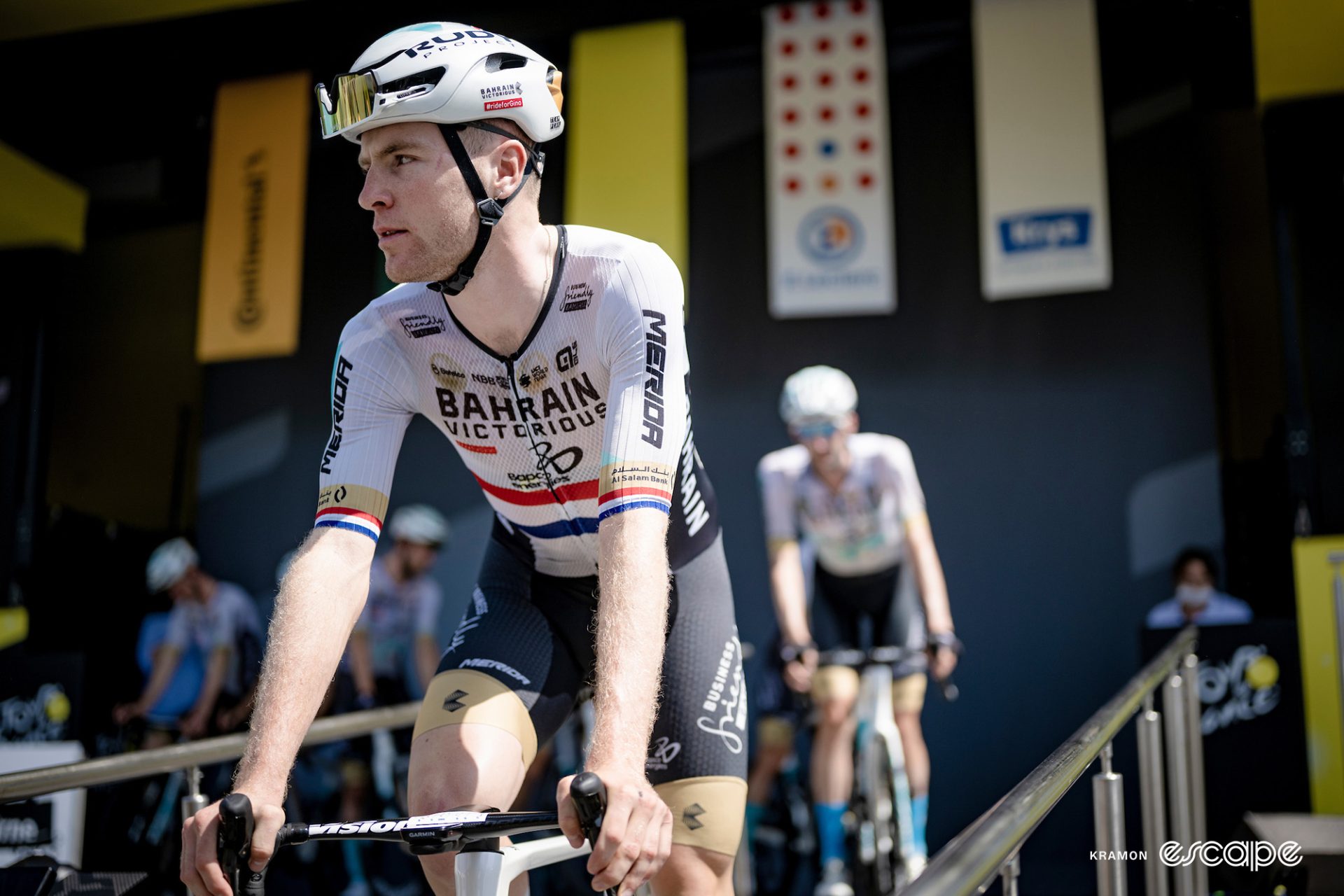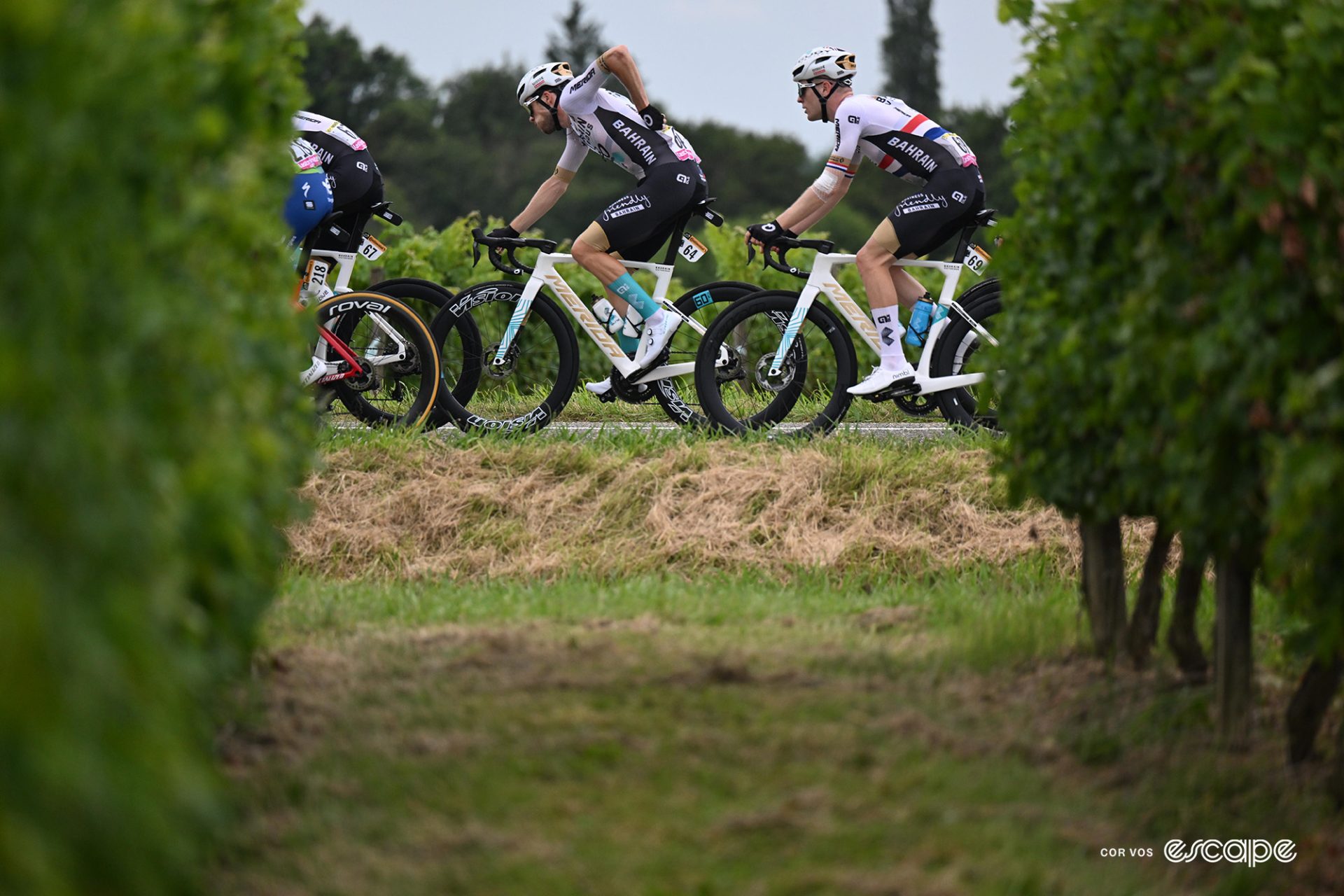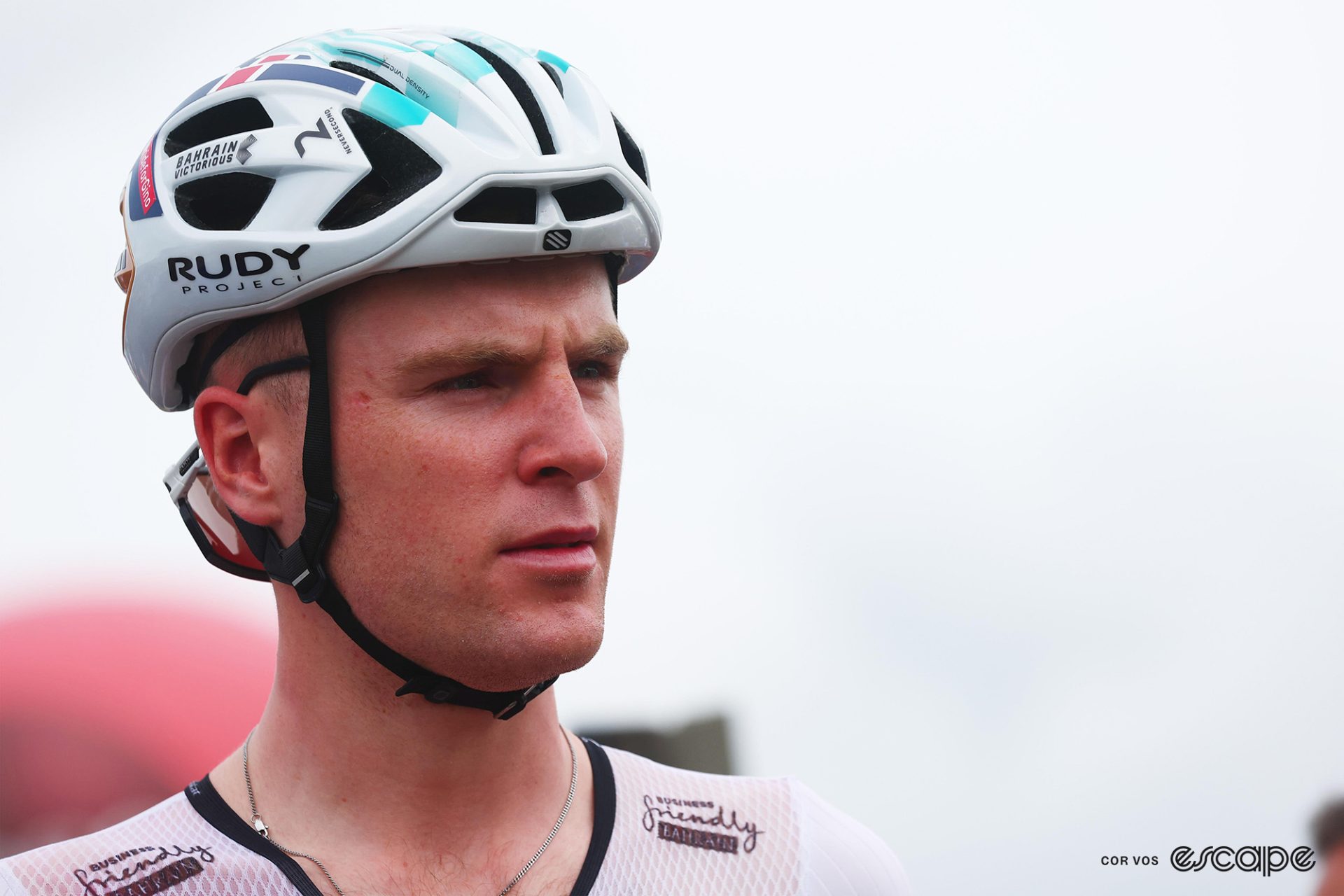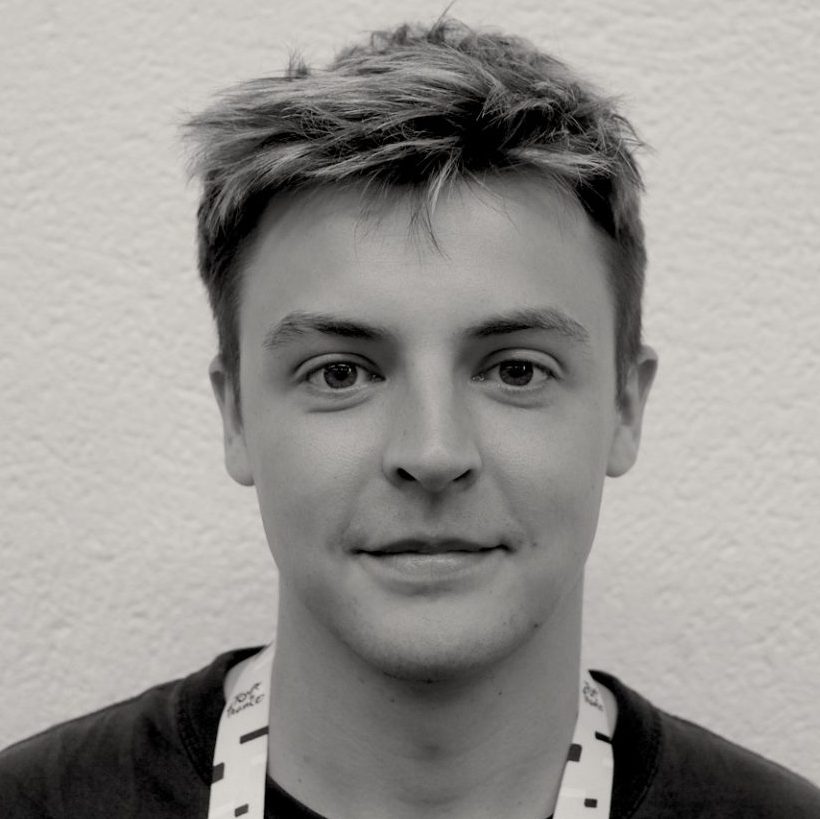Before coming to this year’s Tour de France, Fred Wright studied the race’s road book more than he usually would. For his first two Tours he didn’t pay as close attention: the first in 2021 a baptism of fire, as it is for any rider. Then a break-out 2022 where his plucky attacking style seemingly featured day after day, as well as his candidness, as yet unburdened by the suffocating bright lights of the Tour and the demands of the pro cycling circus. It was refreshing, and the cycling world warmed to it. There weren’t many out there like Fred Wright, and those that were aren’t 23.
A year later, he’s back at the Tour. We meet in Bilbao in the hours before the team presentation, at his Bahrain Victorious team bus at the dock below the concert hall. Riders from various teams are parked up and conducting media. 100 metres away there is one of various Basque protests taking place, where a large group of men have gathered in front of some sort of municipal building, setting off flares and the occasional firework, the loud bang startling anyone in the vicinity.
Wright walks over, a quick “alright mate” and a fist bump. By this stage he is well settled into the groove. The first professional race I covered in person was also his first as a signed-up WorldTour rider – the 2020 Saudi Tour. At that race the press officer sat by as we chatted about his hopes and dreams, and for the rest of the week he shadowed his roommate Mark Cavendish as he learned the ropes from one of the biggest names in the sport. The story since then has been one of gradual improvement, of learning to trust his obvious talent while remaining a human face in what is often a brutal world.
Arguably the biggest moment of Wright’s career so far came in the week leading up to the Tour, when he won the British national championships road race. After so many second, third, and fourth places on Grand Tour stages, everyone knew it was only a matter of time before the now-24 year old would secure his first pro victory.
“I spoke to my dad about it,” he said of the aftermath of that maiden win. “What he said was quite right, that it was almost something that was created. Obviously, I was getting close and whatnot, but to him, he’s been taking me to races since I was 12. It wasn’t like I’d never won. I’d won plenty of things as soon as I started cycling. I was saying [in his post-win interviews] it was like a monkey off my back but I think it was someone else’s monkey … or a monkey that people would put on my back. Not that I put on my back, if that makes sense. But no, it still doesn’t mean it wasn’t such a real relief to do it. And I think of all the races it could have been to do it, that was a pretty special one.
“It just fills me with a lot of confidence going into the Tour, more confidence than I had the last two times I’ve done it. So yeah, I just can’t wait to get racing and see how I fare.”
Since our conversation, Wright has kept his head down. In Bilbao he already knew the second and third weeks were his territory. Lumpier parcours featuring a peloton wearied by days upon days of racing.
“One thing I’ve learned?” We ask him of the difference in himself now compared to this time twelve months ago. “I don’t know …” he begins. “I think I understand myself more, where my limits are, and just from getting into breakaways and from that attacking perspective I kind of trust my level more than I have done previously. I think that should help me. Each year you get more confident.”

Wright says that as he’s grown as a rider, it doesn’t necessarily put a target on his back, as in every race-winning break in the Tour there are a bunch of strong guys who will likely be bigger favourites for the stage. He points out the escape group of stage 13 last year, where he finished second: Mads Pedersen, Filippo Ganna, Stefan Küng, Matteo Jorgenson, and Hugo Houle. The race-crafty Pedersen got that one, while Houle struck a few days later.
“I think compared to last year, I was a bit – not necessarily surprised – but each day I was like, ‘Oh, I can be in the break’,” he continues to reflect on his 2022 Tour. “I was surprised,” he says and then catches himself, before deciding that is how he wants to describe it. “Yeah, I guess I was surprised that I could attack in the way I was attacking. So it brings a bit more expectation coming into this year. I think that means I’ve kind of looked at the stages a bit more more in advance than previous years. It doesn’t mean that I won’t take opportunities when they come because you never know in this race. There might be a sprint day that another team tries to speed things up, and there’s attacks [that] go. I’ll always sort of sniff out an opportunity like that, but no, I definitely looked at … especially in the second or third week, there should be some good days. But it’s still not easy to get in the breakaway …”
The Classics are Wright’s other target beyond Grand Tour stage wins, and this year’s spring was trending in the right direction following another top-10 at the Tour of Flanders, but a crash in the Arenberg forest at Paris-Roubaix ended his chances of a really big result.
“I entered the Arenberg that day in one of the top positions and coming out of it … I’d like to think I would have been pushing for a result in the race. So it was a shame to crash out. Luckily, I was going into a week off anyway so the concussion, although it was bad – I’ve not really had a concussion like that before and I didn’t have the nicest week afterwards – but in terms of race programme it kind of fit it, actually, to have a bit of time off, then reset.” Especially since he’s not coming into this year’s Tour off the back of a COVID-19 positive, Wright feels his preparation is ideal, and his only hope is that he’s not too overcooked before he begins.

Wright’s answers, as you’ve been reading them, come across as a rider full of confidence, which he is, but for brevity’s sake, I’ve edited out a lot of the “you knows” and “I guesses” from his replies – staccato responses of humility in between the clear self-belief. That’s how you’re supposed to be as a pro rider, not talking yourself up, trying to exist between the lines, not giving anyone an excuse to flick you or pass up a turn.
It is clear to outside viewers, even ones who know him as tangentially as his keenest followers in the media do, that there has been a lot of maturing in the past couple of years. Of a rider and person becoming more acclimatised to knowing what he wants. But for the individual, it can often be hard to see these precipitous changes when you’re slowly experiencing them every day.
“I don’t think too much has changed, really,” he says of the past year. “I mean, nah … I wouldn’t say … when I’m out training on my bike, maybe more cyclists that I see say hello. That’s maybe one thing.”
Another thing about Wright is that he still lives in the UK; the European lifestyle afforded in places such as Andorra and Girona haven’t appealed, thus far.
“I like just being able to switch off and be more in a home environment,” he says. “I haven’t sort of been to a place yet in Europe where I’ve thought … but obviously these things take time to create that home environment. Where I live at the moment I just feel like I can fully switch off when I’m back. And even then I’ve found it quite hard. Even just the last period when I’ve moved into a new place and actually haven’t had that much time yet to sort of appreciate it. I think switching off is the most important thing, because we’re away so much. It helps mentally, just being in the UK. Walking down to Tescos [a British grocery store] buying your dinner. The simple things. I think it’s important to have those.”

At Paris-Roubaix in the spring, we met Wright’s girlfriend Emily, a friend of our colleague Rachel Jary, a journalist with Rouleur. They came along in convoy as we followed the women’s race across the cobbles. The next day was very different, for Emily at least, who had to cut her day out short to rush to the hospital to meet her boyfriend following his crash.
“I think I’ve sort of I’ve struck gold with Emily,” Wright says. “Because she was a cyclist but now she’s now in a more normal world. I feel like I’ve got the best of both worlds. She gets it. She was there at Nationals handing out bottles, and was very good at it I must say. But it’s really nice, because she’s living in London at the moment so I can go and visit her and just do normal things. It’s nice to be able to leave the bubble and then come back into it when you want, rather than just always being in the bubble.”
Wright is all feeling, all heart. His emotion following his Nationals win, directly in the aftermath of the death of his teammate Gino Mäder, was superceded by his presence of thought in the ensuing media scrum when someone asked for his thoughts on that awful tragedy by replying: “What do you want me to say? My teammate’s died.”
More generally, Wright has become a go-to for the media. Always affable, happy to engage. The big question is, when so many generally shy away from doing interviews (we hear he even made time to do an interview for a young fan’s school project), why?
“I think so far I’ve not had one where I thought I’ve come across, or someone has said to me, ‘you didn’t come across well’. I guess you get enough positive responses from interviews and stuff and it’s like well I guess people like hearing what I want to say.
“I think I’ve got to be a bit careful that I don’t give myself too many things to do and talk about,” he caveats. “Because I do like it. It feels like part of the whole thing. I see it as when my career is over, what am I gonna do? Maybe there’s something there, I don’t know, but I don’t really mind it. I like talking. I think it’s just from my dad. My dad likes talking, I like talking. It makes it feel more human. You get some journalists … that’s for sure. And I’ve kind of worked out, but still learning a little bit, who it’s alright to talk to and who you should maybe say eff-off too. But no … I think … maybe it will change if I get …
“Get too big?” I interject.
“Nah!” he quickly qualifies. “That just sounds stupid.”
“But it’s true,” I counter. “You can reach a critical mass, like Geraint [Thomas] or [Tom] Pidcock, where it’s all too much.”
“At the end of the day, you can’t reply to every message that someone sends you on Instagram,” he continues. “Even after the British champs, it was not possible to say thanks to everyone. So I guess it comes a point where you just reply to your real close family.”
That’s the hope, then, that as Wright continues throughout his career, we get to keep both parts. The immensely talented cyclist and the very real human.

On stage 8 to Limoges, the day Mark Cavendish crashed out, we saw one of our first glimpses of Wright in this race, as he hit out briefly in the closing kilometres, sensing the smallest sniff of an opportunity. After waiting for the whole Cavendish debrief at the Astana-Qazaqstan bus, I rush over to Bahrain Victorious and catch Wright just as he’s heading back onto the bus. Not knowing he’s just done numerous rounds of interviews, I ask if he’s got a minute. He pauses and thinks. “It’s alright if you don’t,” I say. “Just drop me a text,” he says as he heads up the stairs. This is not how on-their-way-to-being-big-time-riders behave.
So, I type, how has the first week been and how was that first attacking foray in search of the highly coveted first stage win?
“Yeah I was happy with the feelings today,” he replies on his next of a series of unending transfers to yet another middling hotel. “I messed the positioning up a bit in the final, was a bit too far back round the last corner. Followed Victor Campanaerts but it was shut down pretty quick by Jumbo-VIsma. I knew someone was going to attack towards the end. Overall, I’m happy with the way things are going into the next two weeks. Gutted about Cav.”
Let’s hope that Fred Wright, his Tour stage attacks, his tears of joy and attempts to comprehend what he’s achieving out their on the road, as well as his open-door text policy, are a part of our summers for many years to come.
What did you think of this story?

